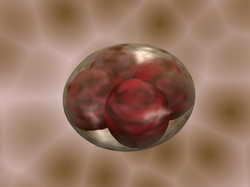Stem cell biology consortium
Stem cells are different from other cells in the body. Stem cells can both self-renew and differentiate. Differentiated or specialised cells lose ability for self-renewal. Organisms need stem cells for the replacement of specialised cells and repair. The 'European consortium for systematic stem cell biology' (EUROSYSTEM) project was initiated with a view to increasing understanding of stem cells and how they function to maintain and repair tissues. The project aimed to develop scientific knowledge, new technological platforms, advanced computational tools and improved information resources for stem cell biology. Researchers developed a systems approach for haematopoietic stem cell differentiation. They established datasets describing haematopoietic stem, progenitor and mature effector cells in both mice and humans. These datasets are a source of quantitative data for future systems biology. Several novel regulators of the blood system were described and their functions were investigated in depth. Gene discovery remains a central goal of modern biology and the development of new pathways leads to rational therapy of blood diseases. In vivo analysis of molecular programmes in normal and diseased epithelial stem cells was conducted using mouse models. Cancer stem cells were tested in vivo to define their importance for resistance to cancer therapies. Cancer stem cells are presumed to have similar capabilities as healthy stem cells. They can regenerate and differentiate into any cell that makes up the cancer. Such cells are often blamed for relapses in patients who by all other measures appear to have been cured. Several in vitro stem cell-based gland formation models have been established. The individual cell-based models have a broad range of applications for which systematic experimental support can be provided. Researchers developed new tools and technologies for better handling and analysis of stem cells. They determined novel regulators of asymmetric and symmetric cell divisions, critical to the fate outcome of the stem cell. Finally, the accumulated wealth of data led to the development and implementation of an integrated data management and analysis platform. Scientific impact of the project was presented in 130 publications in leading journals. Data were disseminated through information portals and workshops, meetings, symposia and conferences.

